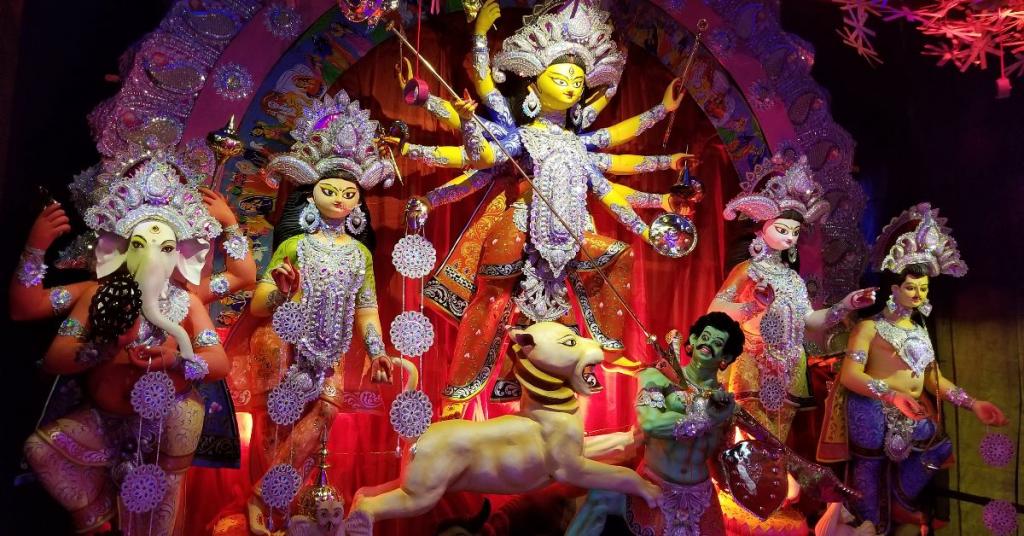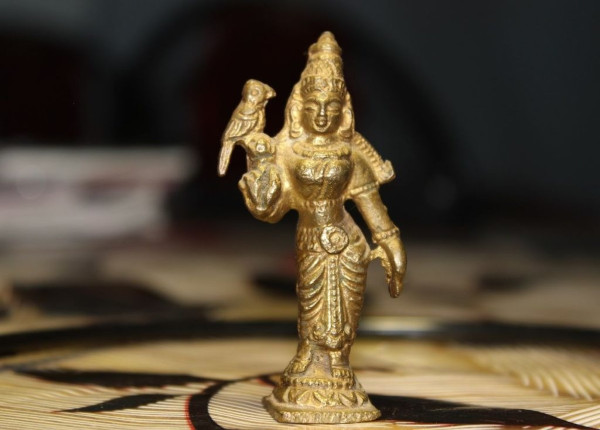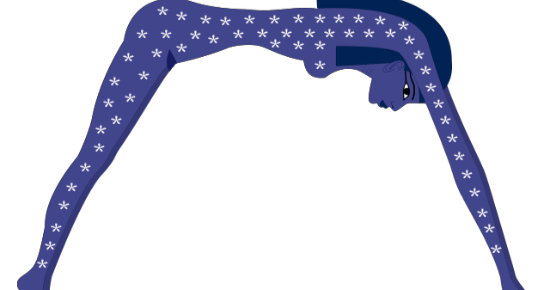There’s a thrilling moment in the story of Durga’s fight with a demon army. The king of the army has just seen the goddess kill his brother. He surveys the battlefield in which Durga’s goddesses are slaughtering his troops. He snarls at her this isn’t fair! There are so many of you against me! She says: “I am the only One here in the perceivable world. No other exists beyond me” (quoted from Devi Mandir’s translation of the Chandi Path.) Then she absorbs all the other goddesses into herself. The battle that follows is one on one, demon against Devi, until at last she raises him up and throws him to earth with a tremendous crash and he is slaughtered. It’s such a relief when the demon falls. Peace immediately spreads through all the worlds. All the gods resume their normal functions, the rain falls, crops grow, people are fed physically and spiritually.
The first time I heard this story Laura Amazzone told it. I was thinking what a wonderful story! The Goddess is a warrior, powerful in her own right, saving all the universe. The female power of life triumphs over death, good triumphs over evil. Then Laura said, “She is everything. She is Durga, and she is also the demon.”
That one sentence shattered a lifetime of dualist thinking. I had to sit with that for a long time while my thought patterns re-arranged. What does the world look like when there is no devil, no adversary, when there is only Her?
Our whole cultural framework depends on conflict. There are two sides. One is right and one is wrong. One is good and one is evil. The bad side threatens our very existence, the good side makes no mistakes. The battle must be waged to the very death. My news feed constantly reinforces both the framework and the alarm: this side is winning! That side made a move! Here is a threat to your job, your health, your freedom, the planet, red alert! Just as an example here are recent Atlantic Monthly headline stories: “Why Obama fears for our democracy”, “The next decade could be even worse.”
One issue here is media focus. Fear sells. If it bleeds it leads. Peddling constant alarm is a lucrative way to get our attention. It’s successful because we love to be frightened. Doom scrolling delivers a physical thrill, a dopamine jolt. It isn’t just media that capitalizes on this. Conspiracy theory communities fish in new members with dopamine bait. I have so many friends who have lost a friend to QAnon.
Another issue is something we might think of as a machine brain. Humans have created technological thought-systems called artificial intelligence to fish the vast sea of information for stuff that interests us. Over time this results a narrowing of what we see and hear. We end up imprisoned in a thought bubble that is invisible to use because it is comfortable. The news we see reinforces what we already know.
Dopamine is the reward, how we get there is the fear. What are we afraid of? There is an adversary which threatens our livelihood and our lives. When the dopamine hit wears off the fear remains. It’s not a false fear, there are real world threats we all face every day. We need jobs to make a living, we need a safe place to live, we need to be able to walk down the street and live through the experience, we need to go on breathing. Economic crashes take away our jobs and our houses, people of color and LGTBQ people and women get raped and assaulted and killed just going about our lives, an invisible virus can take away our breath at any second. The fear of these real world threats turns into anger at the people we hold responsible for them.
The anger isn’t misplaced, it is real and has a function, but we’ve become addicted to that too. Anger gives us the same kind of high as fear. Media stokes our outrage for the same profit-motivated reason. The thought bubbles we inhabit encourage us to identify our adversaries and punish them. Someone says something that aligns them with the enemy camp and we eject them from our world, unfriend them, call for a boycott. We paint them with the mark of the demon.
I’ve written before about the idea that we are all connected and we need each other to survive. However you voted in 2016 or 2020, nearly half the country voted for each candidate. One political party won in 2016, another party won in 2020. In each election the winners and the losers both believed themselves to be on the side of the good guys, waging battle against what is wrong. The problem is that us-versus-them thinking demonizes people. You know people who voted for the other side. Some of the people we think of as evil demons are our neighbors, co-workers, family members, lovers. They belong to a whole to which we also belong. Witches, Pagans, Thelemites, esotericists, all split these votes. They didn’t stop being Witches or Thelemites, or your neighbors or family, because they voted in opposition to you.
We define ourselves as a country divided. We’re pitted against each other. Each side is frightened of the other and determined that next time we will win. But if we keep treating each other as enemies the whiplash will continue. We’ve forgotten how to connect through our commonalities. At the Atlantic Monthly Peter Wehner lofts the idea of relinquishing our opposition to repair our relationships. Yes, hold each other accountable for our own actions, provide aid to people who have been harmed, but pause for a moment to recognize each other’s humanity.
Non-dualist thinking invites us to recognize the essential wholeness of creation. There is both good and evil in everything, in our country, in our communities, in ourselves. If everyone who disagrees with me died tomorrow there would still be evil in the world, and if everyone who agrees with me died tomorrow there would still be good. My friends ask each other, how can someone vote for a person who so clearly does not represent their interests? We do not have an answer, because we’re not asking the right people. If we want to know why someone voted differently than us we need to ask them directly.
We can start un-demonizing our public conversations by releasing the idea that someone who holds a different opinion is evil. We can start by listening to them seriously as if they are actually acting in their own best interests in the best way they can. Interestingly, the advice given to people who have watched loved ones move into cults or abusive relationships or different political beliefs is pretty much the same. Don’t cut them off. Don’t lecture or try to prove them wrong by hammering them with facts. Stay involved, listen to them, gently offer other ways of looking at the situation. Don’t be an enemy, be a friend. Actually this is pretty good advice for making and keeping friends of any kind.
This has the added benefit of breaking our thought bubbles. I lean progressive but I make sure to have #conservativeview in my news feed. As my information stream widens I find I am less likely to spin up about the news. Sure, I’m still concerned about stuff that affects me and still outraged about injustice, but I also notice that seriously considering another point of view results in less knee-jerk alarm.
Social justice work challenges me to recognize where my actions and non-actions harm others. Non-dualist thinking challenges me to recognize where my own actions harm me. Tantric practitioners read Durga’s story to understand our own minds. How do I deal with my own demons?
For one thing I’m trying to break my dopamine addiction. This is an ongoing battle. I have successfully limited my social media scroll to one form of media once a day. I’m still trying to limit my news scrolling to morning but I catch myself doing more passes. The remedy I’m trying right now when I turn to news for entertainment is to focus on actual entertainment. I prepare stories to insert into conversations to steer away from current political events. My family has heard a lot about RuPaul, Megan and Harry, and Taylor Swift at dinner in the last year. It may sound trivial but they’re in the public eye for a reason. There’s a line in one of Taylor’s songs that pertains here, “All of my enemies started out friends.” Same.
I’m disengaging from personal drama. When a conversation starts with “Did you hear what she said?” I’m opting out. I prioritize spending time with peaceful people. My social landscape looks significantly different than it did this time last year, and not because of coronavirus, except that I spend more time with my people outdoors.
I’ve increased the time I spend in practice. Identity itself is a kind of addiction. As I practice releasing the parts of my identity where I am stuck in pain and trauma, I find it easier to release the parts of my identity that deliver the dopamine kick. It’s delicious to be mad at someone, to find fault, but it’s also ultimately upsetting, like eating candy for lunch. Spending time meditating in the silence of the forest may be cold, but it’s ultimately more nourshing, like butternut squash soup. (Insert your own example here if you don’t like butternut squash soup.)
What non-dualist spirituality teaches me is that I don’t need to have an enemy to define me. There may be a battle, Devi against the demon, but the demon is also Devi. The demon is also my neighbor, my family, my friend. The demon is also me. It’s a discovery that leads ultimately to a more peaceful family and community, and a more peaceful personal life.



